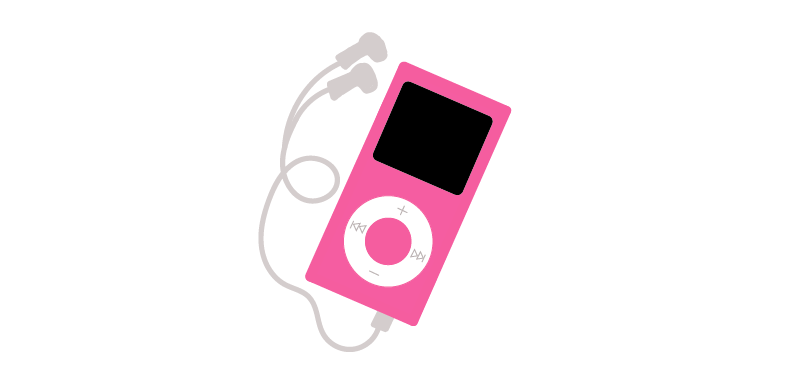My original Daylist. Graphic by Elizabeth Hein.
ANNA GRITZENBACH | ASSISTANT OPINION EDITOR | agritzenbach@butler.edu
When people ask me what I listen to, I tell them I listen to everything. Yes, I know everyone says that but I do actually listen to everything. Dad rock, hip hop, 90’s alternative, party hits, indie — literally every genre. If the song has a beat, I will find something I like about it.
I grew up through arguably the golden age of pop music: the 2000s. Kesha, Britney Spears, Lady Gaga, Shakira and Katy Perry: I burned their music onto CDs and downloaded it onto my hot pink iPod like nobody’s business.
I still love pop music, even without my iPod. With the rise of today’s new pop stars, another pop revolution is upon us.
Despite its popularity, pop music attracts its fair share of haters who attribute their loathing to the genre’s consistent prevalence in society and alleged lack of originality in lyrics and sounds. Not to mention the fact that the majority of pop artists are female and most critics are male, Coincidence? I think not.
Arguably pop music is good because it’s easy to digest. While some of the lyrics may be simplistic and the beats repetitive, there’s no denying that it’s catchy as hell.
It’s a very versatile genre that fits into so many different moods, playlists and scenarios: walking to class, working out, getting ready, partying, driving around — you name it and there’s a pop song that works.
Senior sports media major Gaby Whisler is a huge fan of pop music for the vibes it brings to the table.
“I love how most of the songs just give a good energy,” Whistler said. “And I love pop beats. I feel like whenever I put a pop song on, I’m just in a good mood.”
On the other hand, there are a lot of pop music haters out there. I have heard people say “It all sounds the same” and argue that it’s formulaic and over-commercialized. Many self-proclaimed music critics claim that artists prioritize catchiness and repetition over artistic arrangements and meaningful lyrics.
Sure, popular artists are signed to big record labels with the goal of making money. But that shouldn’t reflect on the artist. Let’s be honest, I don’t think anyone in the art world is in it for the money.
Musicians make music to share their talent and feelings with others, popularity doesn’t affect that. Yes, Taylor Swift makes more money than someone like Maggie Rogers but their primary goal isn’t greed, it’s sharing their experiences through art.
Pop music isn’t just popular music, it’s a distinct sonic genre with iconic works that quite literally shaped the music industry we see today. Arguably the two biggest influences on music have been the King and Queen of Pop: Michael Jackson and Madonna.
There are countless pop songs out there that have meaningful lyrics and unique sounds to them, many of which have created tidal waves of social commotion.
Though pop music gets plenty of negative attention because of the supposed vacuity of the songs, it is worth mentioning that it is marketed primarily towards women and most of the haters tend to be men.
Clare Wohlschlager, a junior music industry studies major, attributed this mostly male hatred to the never-ending, ever-present toxic masculinity deeply rooted in society.
“[Pop music] is woman-dominated … and if you think about the big names in pop right now, specifically [today], it’s Taylor Swift [and] Sabrina Carpenter … it’s very female-dominated and oriented,” Wohlschlaeger said. “And I think that a lot of male listeners, it’s that toxic masculinity thing.”
Pop music is often seen as music for women or feminine individuals, reinforcing gendered stereotypes of the genre. I haven’t met very many straight men who are fans of Taylor Swift.
It’s because of this that it gets a plethora of undeserved hate, but what these haters don’t understand is that pop music is for everyone.
Music, in general, shouldn’t be limited to just a certain group of people, pop music is popular because it’s accessible. With streaming services at the tip of our fingers, people should branch out more, find new artists — underground or mainstream — and share them with each other.
I get it, you want to be the cool, mysterious person who listens to a band that no one has heard of. But no one is going to think you have bad music taste if you listen to a mainstream Charli xcx song.
First-year anthropology-psychology major, Ginny Weykamp, hypothesized that pop music is simply too mainstream and that’s what people hate about it.
“Pop music gets such a bad rep because it is so popular and it is so widespread,” Weykamp said. “A lot of people want to listen to music to have a very unique, specific experience with that song, and the more underground or indie that song is, the more cool people think it is. But pop music, just because … so many people listen to it, doesn’t mean you can’t have an original or unique experience or relationship to the song.”
Indie and rock music are often cited as more authentic, genuine genres by the music elitists. Don’t get me wrong, I love some indie and some rock, but I don’t think that there’s one genre that’s better than the other.
That’s my favorite part about music — you’re not limited to just one genre, no matter what the haters say, they’re not some big wig music critic. They’re literally just a Reddit user.
Listen to whatever makes you happy. If that’s not pop, that’s fine, but don’t rain on my parade buddy. For the record, jamming out to a Chappell Roan song doesn’t make you any less manly or cool, but hating on it does.



